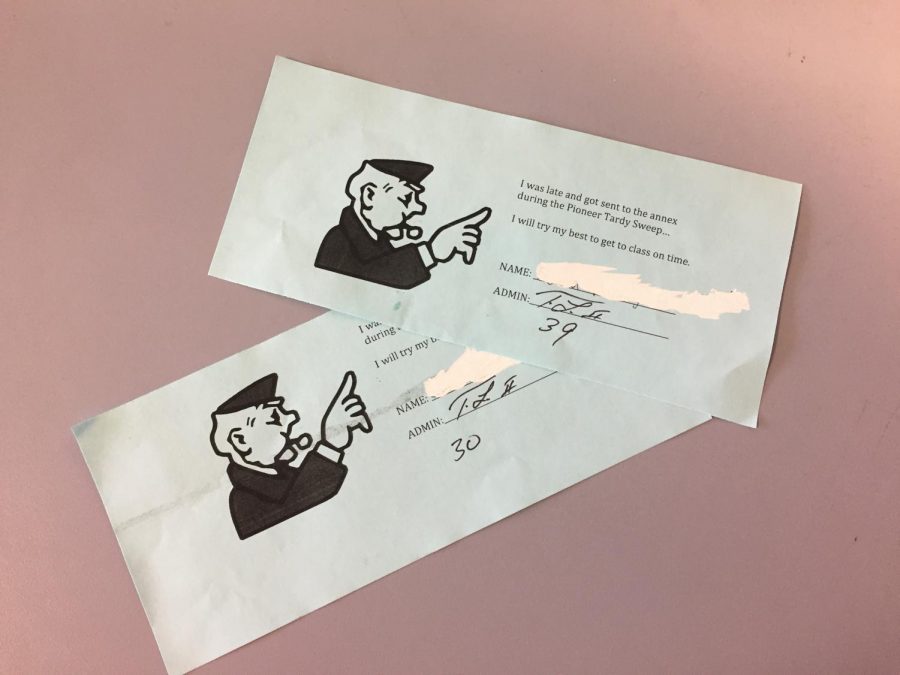Tardy sweeps catch students being late, make them later
On Tuesday, October 2nd, 176 students were sent to the annex during first hour because they were tardy. The administration conducted a tardy sweep that resulted in over 200 students being late to class.
The administration decided to implement these sweeps to combat the rising tardy numbers They hope that, by preventing students from getting to class, the students will learn that tardiness is not acceptable. Principal Tracey Lowder wants students to get to class on time and maximize their learning. “The message is that we value being in class on time,” said Lowder.
Junior Tasha Loomis was caught in the tardy sweep because she accidentally slept in late. Because of the tardy sweep, Loomis missed 45 minutes of first hour and was required to make up an assignment. She feels like the tardy sweep was a “huge waste of time” because she missed more class than she had to.
Not only will tardiness affect the late student, but it will distract the rest of the class. When a student arrives late to class they need to find their seat and unpack their bags, which interrupts the teacher. Not only would the teacher need to find their place again, but they would have to make an effort to make up for the information that the student missed. “[Tardiness] causes a lot more work for a lot more people,” said Lowder.
Matthew Rice, a Pioneer math teacher, feels that Pioneer needs the tardy sweep because “students being late to class seriously impacts their education.”
Lowder is not sure that the tardy sweeps will have any effect on the number of students tardy, but he is taking this opportunity to teach life skills. “It helps us to deliver the message that we value our time, we expect you to be on time, and it’s a life lesson- it’s a life skill,” said Lowder. He points out that in the future when students have jobs, they will need to arrive at their job on time, or else they risk the chance of being fired. Although the tardy sweep has no repercussions, Lowder hopes that the students caught in it will use it as a learning lesson.
If the tardy sweep does not work, Lowder would need to find the exact reason why students do not want to go to class. According to Lowder, the one thing students can control is when they go to class. “Students don’t have control of the curriculum, students don’t usually have control as to how the curriculum is being taught… The one thing that is in their power is when they go,” said Lowder.
Rice believes that the tardy sweep will reduce the number of students late. “I think that students got a new perspective of the inconvenience of being late [which] really impacts their learning,” said Rice.
Unlike Rice’s belief, Loomis doesn’t think that the tardy sweep will work because “kids are just going to be late no matter what you do.”
Lowder recognizes that not everyone can get to school on time every day. Sometimes it is out of the students’ control, whether it’s traffic or bad weather. There are almost 2000 students at Pioneer, and there are only six buses. If 60 students ride each bus, 360 students take Pioneer transportation to school. Meaning, 1600 students are either driving to school, dropped off, taking Ann Arbor Public Transportation, or walking. Lowder realizes “that sometimes it’s not easy to get here” in the time frame that is available, but he expects students to take into account the obstacles. “I expect students to ultimately learn that, if they’re barriers that are going to prohibit you from going where you need to go in the amount of time that you’re used to, then you need to recognize that and set aside more time,” said Lowder.
A week after the tardy sweep, Lowder sent an email warning of a cancellation in food deliveries. According to Lowder, between 5 and 10 students are late to class every day because they are waiting for food. Once their food arrives, they will possibly eat it in the annex or the cafeteria, causing them to miss more class time. Some students might decide to eat their food in class, but at this point, there is an equity issue. Some students do not have the resources to order because they do not have the money. “Those that have are basically putting it in the face of those that don’t have,” said Lowder. Because of this problem, he is contemplating shutting down deliveries altogether.
There will be more tardy sweeps in the future, but they will not be the same as the first one. Instead of an all day tardy sweep, it will take place on a randomly picked day, before one hour. This is to prevent students from planning out the days that they will be on time to class. By making it a surprise, the administration hopes the students will get into a pattern of getting to class on time.


